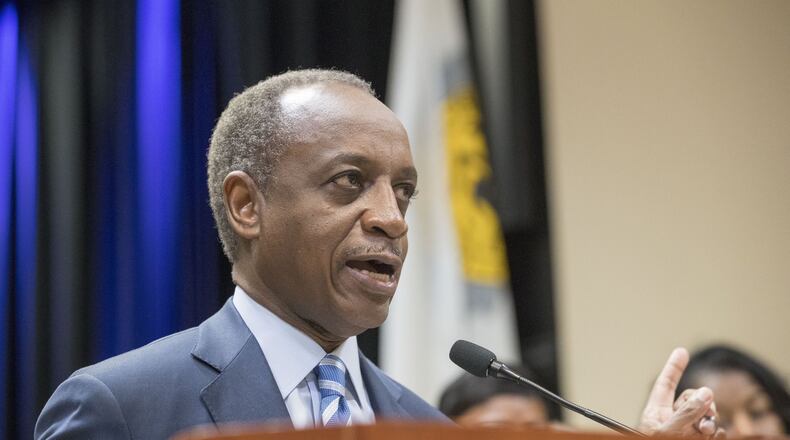Note: This story has been corrected to say that the county on Tuesday said it may contribute up to $8 million more a year to the pension.
DeKalb County is getting ready to tackle a $1 billion pension deficit that was created by years of severe underfunding.
Under a proposal by county administrators, DeKalb would commit to additional contributions of up to $8 million a year over the next five years to help close the funding gap.
Employees will not be asked to contribute more.
“We are on firm footing and we’re focused on ensuring stability and financial integrity in the fund going forward,’’ CEO Michael Thurmond told DeKalb County commissioners at a meeting on Tuesday.
Thurmond's plan would provide less than the additional contributions proposed by the DeKalb County Pension Board, which asked administrators to pony up $12 million more for 2019. With the higher contributions, the pension board had said, the funding gap could be closed by 2028.
While Thurmond didn’t recommend committing that much to the pension, he said he may recommend that more money be drawn into the pension if county reserve funds are available at year’s end.
DeKalb’s pension, which currently serves more than 11,000 active employees, retired workers and their beneficiaries, appears among the worst funded in the state, according to a new state auditor’s report on local government retirement plans. But the key reason is that the pension board had adopted lower estimates of how much the fund’s investments will earn in future years. Few other local government pensions have been as conservative in their estimates.
At Tuesday’s meeting, Commissioner Larry Johnson cautioned that the lower estimate would not paint an accurate picture of county finances to credit rating agencies. But pension board chairman Ed Wall said the credit agencies examine underlying numbers to determine financial health.
While over the last decades, the fund’s investment managers reported healthy returns, last year the fund’s performance was dismal, as markets rocked with volatility. For 2018, the fund reported a loss of 6.68% — worse than its benchmark, which reported a loss of 5%.
Records show the fund had a market value of $1.26 billion as of Dec. 31. A month prior, it reported a market value of $1.37 billion.
Investment returns are a key funding source for the pension, along with county and employee contributions. Taxpayers are on the hook for any shortages if contributions and investment earnings aren’t enough to pay obligations to employees.
Larry Jacobs, DeKalb’s assistant finance director who helped craft the long-term strategy to shore up the fund, said the shortfalls didn’t happen overnight.
In the late 1990s, the pension was fully funded. Seeing that it was apparently in good shape, the county lowered its contribution rate to half a percent of employee salaries from 1998 to 2004. In 2005, it raised the rate to 3%, increasing it again by another percentage point in 2006. By 2011, the county had increased the rate to 17%. However, it found itself unable to recover from years of lesser contributions and a series of major downturns in the markets.
“In the past, DeKalb chose the path of least resistance,’’ Jacobs said.
In 2018, the county contribution was 18.56% of pay.
A number of commissioners appeared to be satisfied with Thurmond’s plan to increase contributions, which is part of the 2019 budget proposal.
Over the next several months, DeKalb County Commissioner Jeff Rader said he and others on a county finance team are expected to study an option to provide some retirees with a cost of living increase.
The budget must be adopted before Feb. 28.
About the Author
Keep Reading
The Latest
Featured




